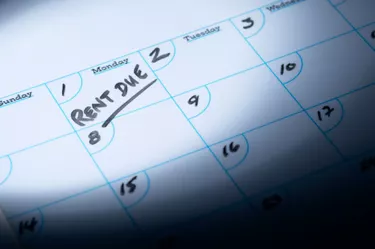
Paying rent is one of the primary responsibilities of tenants and an important source of income for landlords. Most tenancy agreements lay out a specific policy for paying rent, including the amount, the due date and how tenants should submit payment. Depending on your lease terms and state laws, if you fail to pay rent on time and in full, you may face a late fee or even eviction.
Time Frame
Video of the Day
Once rent is officially late, a landlord can immediately begin eviction proceedings. This does not mean that if you forget to pay your rent and pay it a day late you face eviction. Instead it means that landlords have the option to pursue eviction any time rent is late, subject to any terms that define a recourse for late rent the rental agreement. State laws require landlords to give tenants early notice prior to an eviction, usually three days before the tenant must vacate the property. This is substantially less than the 30-day notice landlords must give to terminate leases when rent is paid in full. Early warning is one thing tenants risk by failing to pay rent on time.
Video of the Day
Lease Agreements
Your lease agreement should include a section devoted to paying rent. In many cases, landlords will provide a grace period following the rent's due date. For example, if rent is due on the first of the month, the landlord may allow a five-day grace period. Rather than authorizing late rent, this essentially extends the legal due date to the sixth. Landlords may also assess late fees on rent, which can be flat fees or tiered fees based on the amount of time that passes between the due date and receiving payment.
Renters' Rights
Some states allow tenants to withhold rent in extreme cases when landlords are in violation of the terms of a lease agreement. Even in a state with such a law, tenants may not simply stop paying rent. Instead they usually need to hire an attorney and place the rent in escrow. Following a court proceeding, the money will either go to the landlord as back rent or return to the tenant if the court finds that the landlord was at fault. The same laws that allow tenants to withhold rent may also shield tenants from eviction during the course of the legal proceedings. Rental laws vary by state, and it's important to understand your specific rights before refusing to pay rent and risking eviction.
Considerations
Often it isn't in a landlord's best interest to start eviction proceedings the first time a tenant is late to pay rent, or when the tenant is late by just a few days. In most cases the cost of a legal battle or the inconvenience of finding a new tenant make it in a landlord's best interest to work with tenants. This is the reason landlords may include a grace period, because they would rather receive rent slightly late than not receive it at all. Tenants who expect to be late with rent may have success contacting their landlords and asking for an extension or offering a partial payment with a plan for full repayment in the future. Any special arrangement needs to be in writing and signed by both parties to be legally valid and safe.